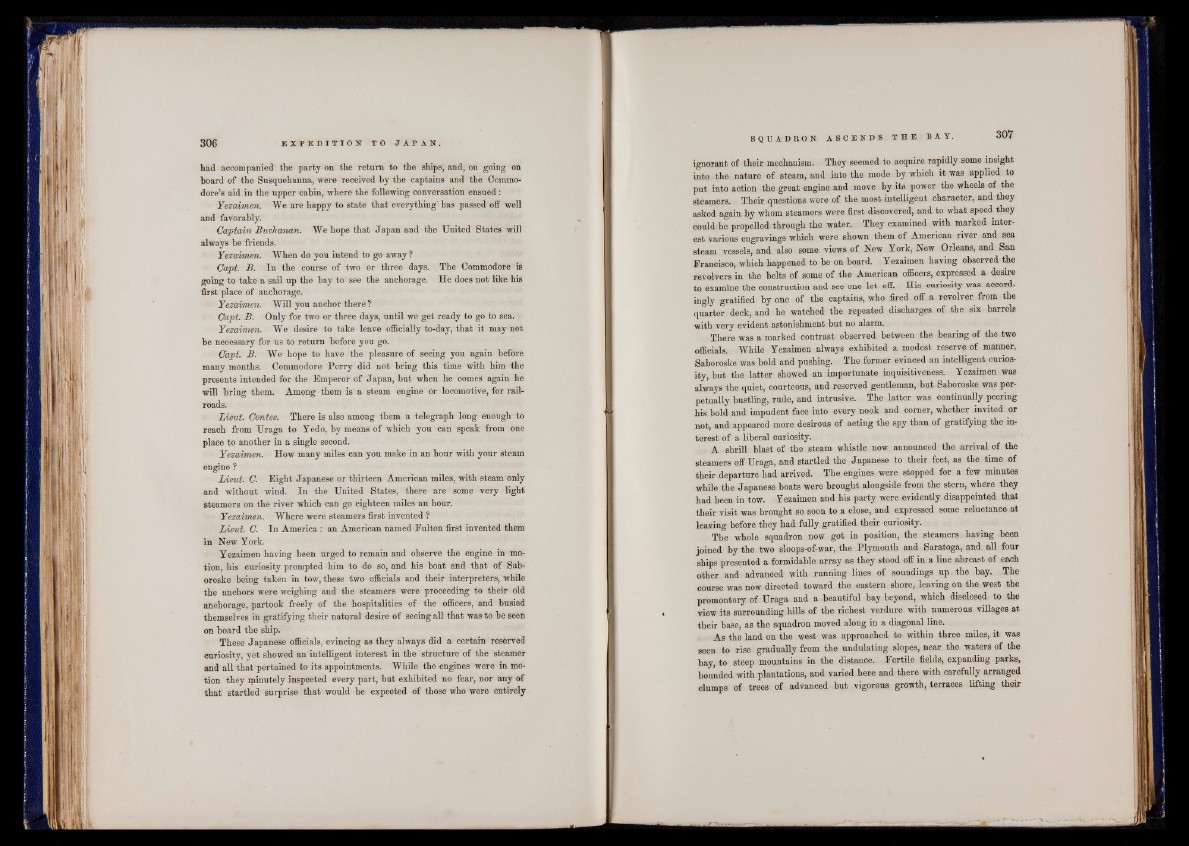
had accompanied the party on the return to the ships, and, on going on
hoard of the Susquehanna, were received by the captains and the Commodore’s
aid in the upper cabin, where the following conversation ensued:
Yezaimen. We are happy to state that everything'has pasBed off well
and favorably.
Captain Buchanan. We hope that Japan and the United States will
always be friends.
Yezaimen. When do you intend to go away ?
Capt. B. In the course of two or three days. The Commodore is
going to take a sail up the hay to see the anchorage. He does not like his
first place of anchorage.
Yezaimen. Will you anchor there ?
Capt. B. Only for two or three days, until we get ready to go to sea.
Yezaimen. We desire to take leave officially to-day, that it may not
he necessary for us to return before you go.
Capt. B. We hope to have the pleasure of seeing you again before
many months. Commodore Perry did not bring this time with him the
presents intended for the Emperor of Japan, hut when he comes again he
will bring them. Among them is a steam engine or locomotive, for railroads.
Lieut. Contee. There is also among them a telegraph long enough to
reach from Uraga to Yedo, by means of which you can speak from one
place to another in a single second.
Yezaimen. How many miles can you make in an hour with your steam
engine ?
Lieut. C. Eight Japanese or thirteen American miles, with steam only
and without wind. In the United States, there are some very light
steamers on the river which can go eighteen miles an hour.
Yezaimen. Where were steamers first invented ?
Lieut. C. In America : an American named Fulton first invented them
in New York.
Yezaimen having been urged to remain and observe the engine in motion,
his curiosity prompted him to do so, and his boat and that of Sab-
oroske being taken in tow, these two officials and their interpreters, while
the anchors were weighing and the steamers were proceeding to their old
anchorage, partook freely of the hospitalities of the officers, and busied
themselves in gratifying their natural desire of seeing all that was to he seen
on hoard the ship.
These Japanese officials, evincing as they always did a certain reserved
curiosity, yet showed an intelligent interest in the structure of the steamer
and all that pertained to its appointments. While the engines were in motion
they ipinutely inspected every part, but exhibited no fear, nor any of
that startled surprise that would he expected of those who were entirely
ignorant of their mechanism. They seemed to acquire rapidly some insight
into the nature of steam, and into the mode by which it was applied to
put into action the great engine and move by its power the wheels of the
steamers. Their questions were of the most intelligent character, and they
asked again by whom steamers were first discovered, and to what speed they
could be propelled through the water. They examined with marked interest
various engravings which were shown them of American river and sea
steam vessels, and also some views of New York, New Orleans, and San
Francisco, which happened to be on board. Yezaimen having observed the
revolvers in the belts of some of the American officers, expressed a desire
to examine the construction and see one let off. His curiosity was accordingly
gratified by one of the captains, who fired off a revolver from the
quarter deck, and he watched the repeated discharges of the six barrels
with very evident astonishment but no alarm.
There was a marked contrast observed between the bearing of the two
officials. While Yezaimen always exhibited a modest reserve of manner,
Saboroske was bold and pushing. The former evinced an intelligent curiosity,
but the latter showed an importunate inquisitiveness. Yezaimen was
always the quiet, courteous, and reserved gentleman, but Saboroske was perpetually
bustling, rude, and intrusive. The latter was continually peering
his bold and impudent face into every nook and corner, whether invited or
not, and appeared more desirous of acting the spy than of gratifying the interest
of a liberal curiosity.
A shrill blast of the steam whistle now announced the arrival of the
steamers off Uraga, and startled the Japanese to their feet, as the time of
their departure had arrived. The engines were stopped for a few minutes
while the Japanese boats were brought alongside from the stern, where they
had been in tow. Yezaimen and his party were evidently disappointed that
their visit was brought so soon to a close, and expressed some reluctance at
leaving before they had fully gratified their curiosity.
The whole squadron now got in position, the steamers having been
joined by the two sloops-of-war, the Plymouth and Saratoga, and all four
ships presented a formidable array as they stood off in a line abreast of each
other and advanced with running lines of soundings up the bay. The
course was now directed toward the eastern shore, leaving on the west the
promontory of Uraga and a beautiful bay beyond, which disclosed to the
view its surrounding hills of the richest verdure with numerous villages at
their base, as the squadron moved along in a diagonal line.
As the land on the west was approached to within three miles, it was
seen to rise gradually from the undulating slopes, near the waters of the
bay, to steep mountains in the distance. Fertile fields, expanding parks,
bounded with plantations, and varied here and there with carefully arranged
clumps of trees of advanced but vigorous growth, terraces lifting their